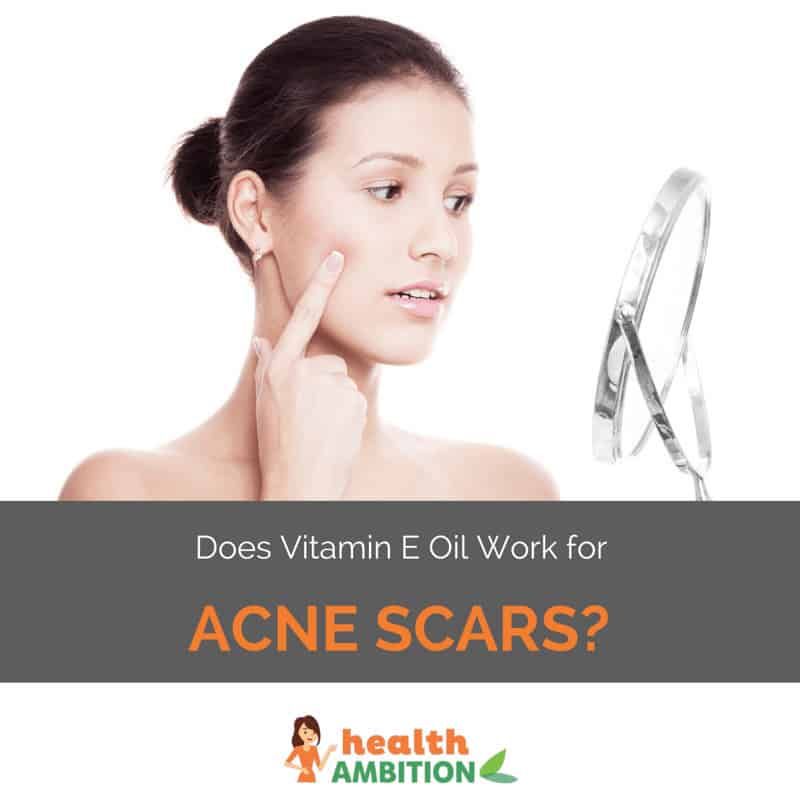
I’m not trying to brag here, but I get compliments on my skin pretty often. The reason I want to share this is because if you had seen pictures of me when I was about 14 years old, you’d never believe I was the same person.
Acne scars began to plague me just after I graduated from high school. Throughout my teen years, I couldn’t stop myself from picking at my pimples frequently. My mother warned me that it would cause scars but I didn’t listen to her. I just wanted my acne gone and popping my pimples gave me instant gratification. Under the surface however, something different was happening.
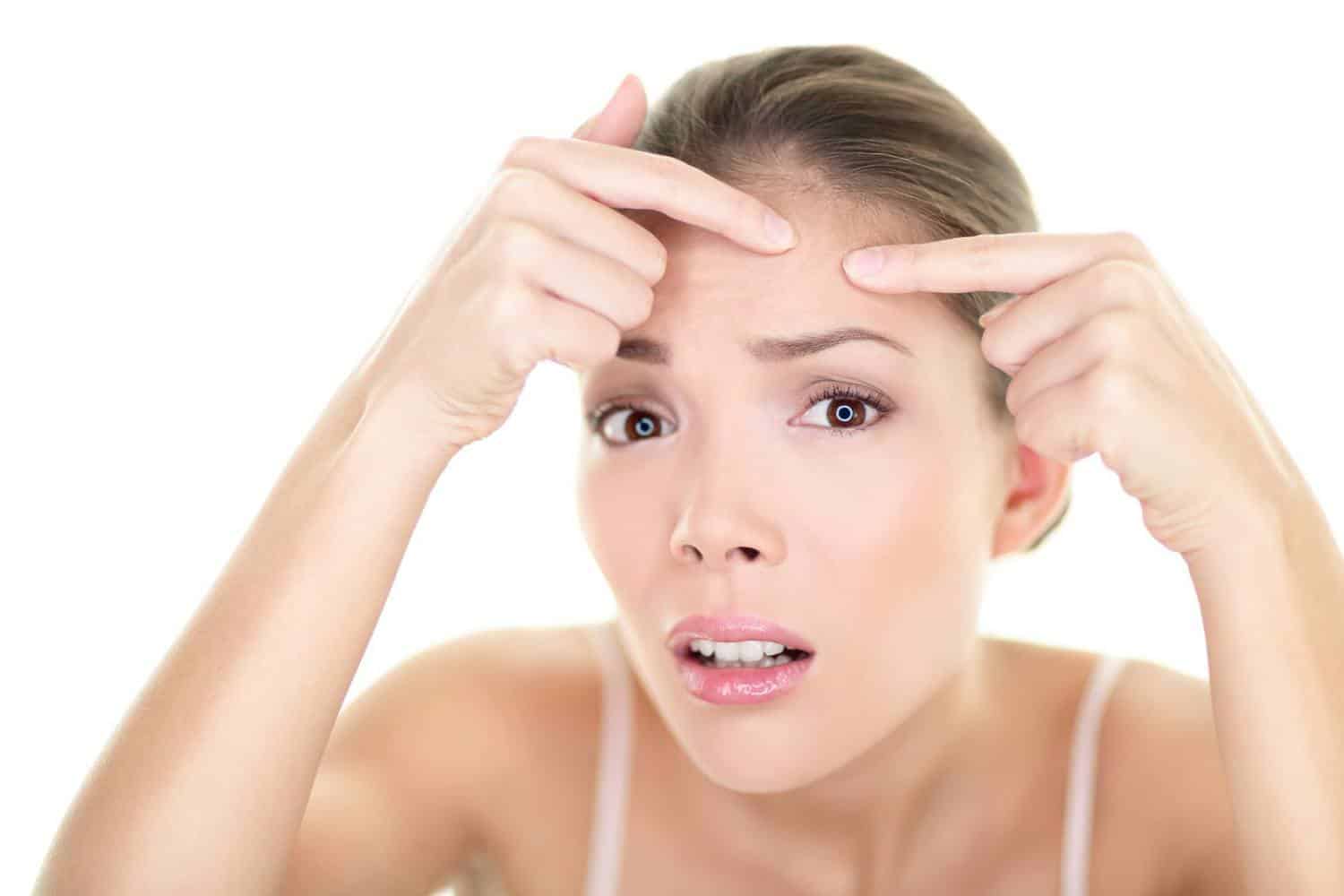
My acne scars became so bad in college that I was too embarrassed to show my face in class some days. Luckily, a friend of mine said she had struggled with the same issue but found out you can use vitamin E oil for acne scars. I really didn’t believe her, but the proof was in the pudding, i.e. her face.
Long story short, I tried using vitamin E oil for acne scars too. Curious what the outcome was? Read on to find out. Let me tell you how these suckers develop in the first place though.
What is Acne?
According to the Mayo Clinic, “Acne occurs when hair follicles become plugged with oil and dead skin cells.” Your hair follicles are connected to oil glands. Your oil glands produce an oily substance called sebum, which lubricates your skin and hair. The sebum travels along the hair and out through the opening of your hair follicles and onto your skin’s surface.
If your body creates an excess of oil and you have a multitude of dead skin cells, the two can block the hair follicles. Once a blockage occurs, bacteria can get in and multiply causing redness and inflammation – also known as a pimple.
You can see a live animation of a pimple forming in this YouTube video.
The Mayo Clinic tells us that the hormones called “androgens” increase when young boys and girls are going through puberty. The raised androgen levels causes your sebaceous glands to enlarge and make more of that oily substance – sebum.
Hormones also come into play during pregnancy or when using oral contraceptives. As if being pregnant isn’t hard enough! Oh and don’t forget menopause, toss some hormonal acne to that as well.
Getting Rid of Acne Scars
If you’re looking and feeling how I was in college, sitting at home with a face full of embarrassing acne scars, don’t worry. There are methods out there that can help you lessen the issue.
One of the most popular products that appear when researching home-based treatments for acne scars is vitamin E oil. The purpose of today’s article is mainly based around how to use vitamin E oil for acne scars.
Vitamin E Oil for Acne Scars
Vitamin E oil is a highly debated topic in the world of health and medicine. I want you to review this information with caution and always consult your physician before using any form of supplementation.
Vitamin E boasts some amazing benefits. According to WebMD, these benefits include but are not limited to:
- Preventing heart disease, blood vessel disease, hardened arteries, chest pain, leg pain due to blocked arteries and high blood pressure
- Treating complications from diabetes
- Preventing cancer, specifically lung and oral cancer in smokers along with colorectal, gastric, prostate, and pancreatic cancer
- Helping with brain diseases such as Alzheimer’s, dementia, Parkinson’s, epilepsy, etc.
- Improving endurance, increasing energy, decreasing muscle damage after exercise
- Treating aging skin, sunburn, skin disorders, and the effects of chemotherapy on the skin
Honestly the list goes on and on. Vitamin E is obviously an extremely important vitamin. WebMD also tells us that vitamin E it is required for proper function in many organs of the body. It’s also an antioxidant. Antioxidants are highly important because they help prevent cell damage.
How Does Vitamin E Help With Acne Scars?
So what does this all have to do with treating acne scars? This article gives a great overview of the benefits of vitamin E for your skin. These benefits include:
- Regulating production of skin proteins like collagen and elastin
- Maintaining skin health by neutralizing free radicals that damage skin follicles and increase keratin formation
- Helping to lighten scars and dark spots on your skin
- Promoting tissue repair
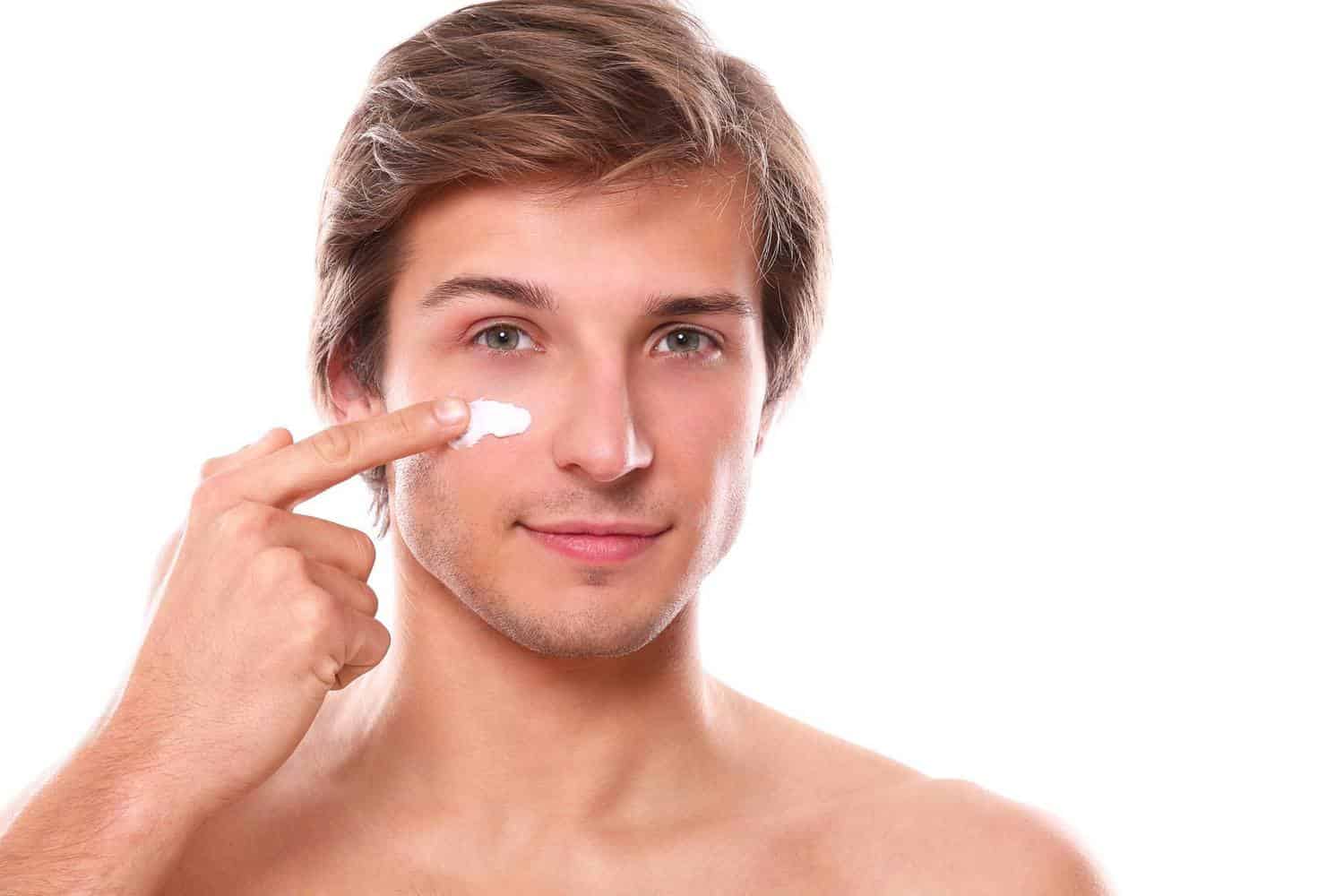
Long story short, vitamin E helps to repair your skin and protect it from continued damage. The transformation in your acne scars will not happen overnight but with continued and consistent use, you should see noticeable effects within about three months.
The Controversy
The bad news is that vitamin E oil is controversial due to some studies that have shown negative effects when taken in high dosages. There was actually a study done where over 130,000 people took vitamin E for various reasons but those who took higher doses had a higher risk of dying. This is some pretty serious information.
Vitamin E in Your Diet
The good news is you can absorb the benefits of vitamin E by ingesting it through foods in your diet.
Dr. Celeste Robb-Nicholson, Editor-in-Chief of Harvard Women’s Health Watch suggests that you “try to get most of your vitamin E from food. There’s strong evidence that diets containing large amounts of vitamin E –rich foods are good for you.

If you’re uncertain how much you’re getting from you diet, consider taking a supplement containing no more than 150-200 IU per day. At that level, taking vitamin E still falls under the rubric of ‘shouldn’t hurt and might help.’”
WebMD lists these foods that contain vitamin E:
- Vegetable oils
- Cereals
- Meat
- Poultry
- Eggs
- Fruits
- Vegetables
- Wheat germ oil
WebMD also has a pretty extensive list of the recommended doses for each condition you may be trying to treat. Check out that list here.
While ingesting vitamin E orally brings massive benefits, including the prevention of hormonal imbalances that cause acne, topical administration is most beneficial for removing acne scars.
How to Use Vitamin E Oil for Acne
According to Progressive Health, the maximum recommended daily dose of vitamin E when taken orally is 15mg per day. Taking selenium alongside vitamin E capsules may help your body absorb it.
To treat acne however, you’ll want to apply vitamin E oil directly to the affected area. To do this you’ll need a bottle of oil or some vitamin E capsules. Simply poke holes to release the oil onto your skin.
Before applying, make sure you have a freshly cleaned face. Wash with an all-natural cleanser. There’s no real need to dry off your face but you can do so if you want.
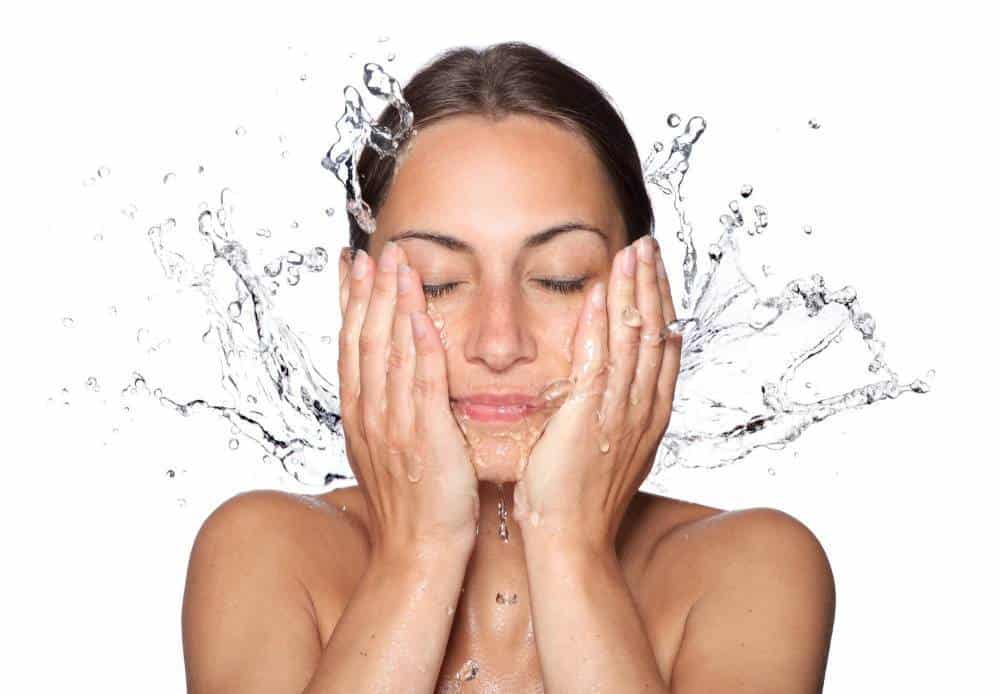
Next, rub the oil onto the affected area with a cotton ball. The oil will be absorbed into the scar tissue. Leave the oil on for at least 10 minutes before rinsing it off. You can also apply the oil, wipe away any excess and then leave it on overnight.
Repeat this task daily until you notice an improvement in the appearance of your scars. I’ll be honest, it took over three months for me to notice a difference but it did work. My scars faded significantly and like I said, you’d never know today that I was a pimply-faced young girl many years ago.
Preventing Acne Scars in the First Place
It goes without saying that the best way to avoid acne scars is to prevent them developing in the first place. I’m sure you know that the main culprit is picking and breaking the skin on your pimples, but there are some simple lifestyle changes that can lessen your risk for acne scars.
1. Stress
Being under high amounts of stress can actually increase oil production. The bad part is that stress causes acne, and then acne causes stress. It’s a never-ending cycle! No wonder so many older women are still fighting acne. As a mom or businesswoman, stress is inevitable and constant.

By simply taking some time to yourself or participating in stress-relieving activities you can decrease oil production and therefore acne.
2. Diet
You diet can be another major player in the world of acne. There have actually been studies done that show empty carbohydrates and even chocolate can increase oil production and therefore acne. Empty carbohydrates are simply foods that spike your blood sugar too quickly.
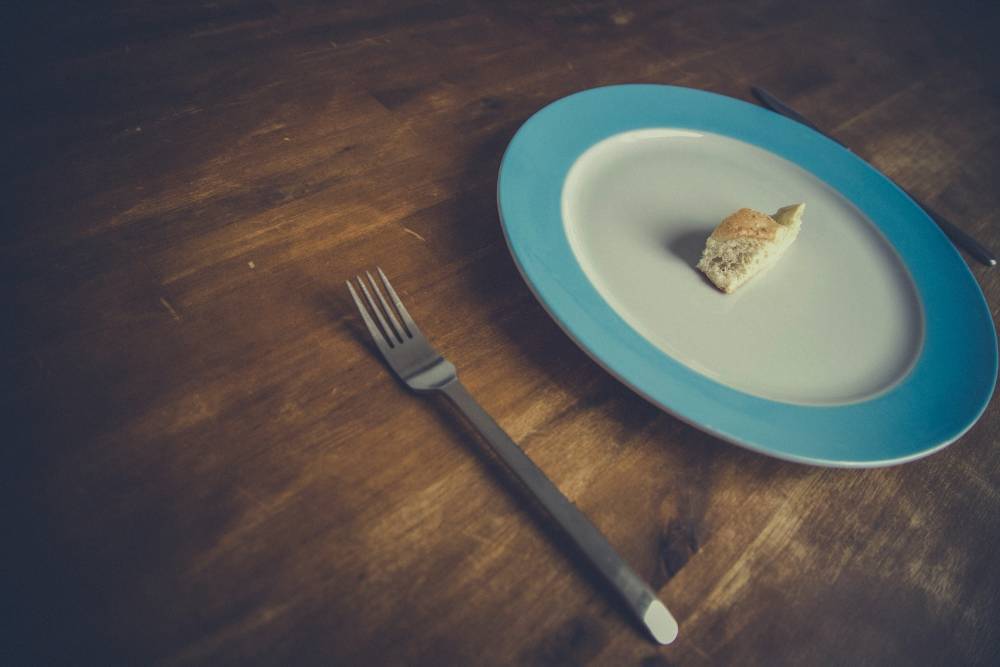
Knowing this, you’ll want to embrace carbohydrates with a low glycaemic index. This simply means these foods are processed by your body more slowly, avoiding a high spike in your blood sugar level.
3. Facial Hygiene
What are you doing to take care of your face each day? I’m not just talking about a nightly wash.
Are you constantly touching your face? Frequently wiping your cheeks or scratching your nose leaves bacteria on your face. I had no idea how often I was touching my face until I made a mental note to pay attention to it. Sometimes it’s as simple as working to break a habit like sitting with your hand on your chin when you’re working.
You’ll also want to pay attention to your wardrobe. Are you wearing the same hat day in and day out? Wearing a hat, especially a dirty one, can trap bacteria and dirt against your skin which of course will leak into your pores.
Always be sure to clean your face properly after a heavy workout. Mixing sweat with increased oil production and dead skins cells can cause an even worse reaction. Again, be careful how much you are touching your face while in the gym. Putting your hands on equipment, then sweating and then touch your face is a bad combination.
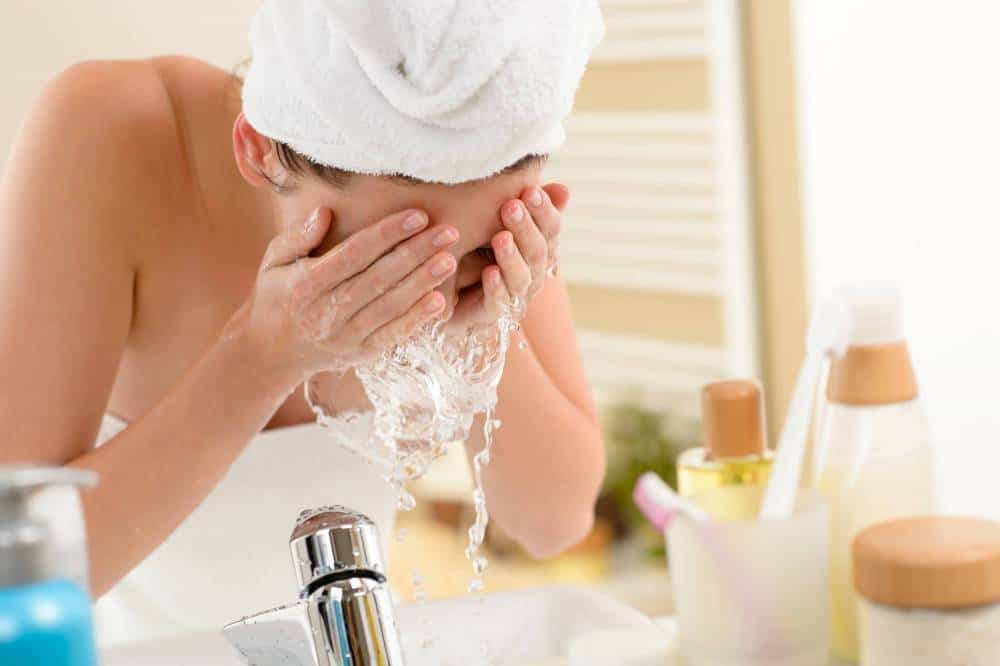
Lastly, does your significant other have a significant facial hair or a hardy beard? If so, his grooming regimen will also affect your face. If you spend a lot of time making out with a bearded man (!), make sure he’s keeping it clean as well as moisturized.
He can easily grab some beard oil on Amazon. Lubricating his scruff will keep his hair softer and therefore won’t scratch and create small lesions on your face which invite bacteria and infection.
4. Pore-Clogging Products
When using makeup or any cosmetics on your skin, make sure they are non-comedogenic. “Non-comedogenic” means it won’t clog your pores. While some sceptics don’t think you can trust the labelling of non-comedogenic products, I’d say it’s a good standard to start with.
According to How Stuff Works, non-comedogenic products are usually oil-free. They break down excess oils but won’t take away all of the moisture your skin needs. You might also hear the term non-acnegenic; this term means the product shouldn’t cause acne.
I must note that there are no official regulations on marking your product as non-comedogenic. So while I hope we can trust the manufacturers of products, it’s not always a guarantee. You have to try it for yourself and see which non-comedogenic products truly work for you.
5. Smoking
Did you know that smoking cuts off some of your skin’s oxygen supply? This LiveStrong article mentions how smoking affects the skin by narrowing the blood vessels in your skin’s outermost layer. This leads to decreased blood flow to your skin, meaning you don’t get enough oxygen and other nutrients.
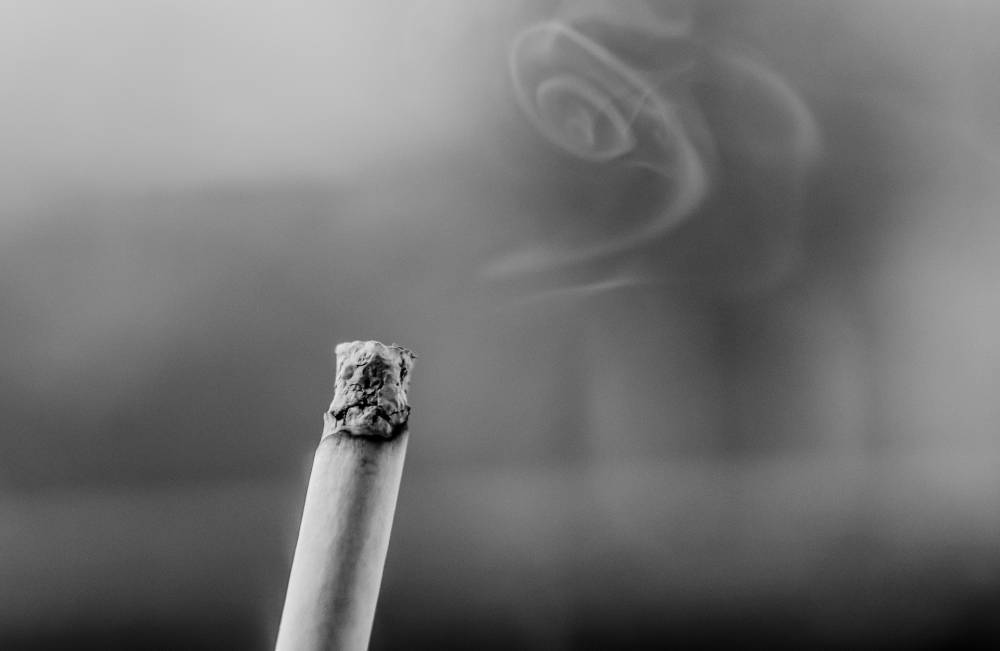
Unhealthy skin is a great playground for bacteria, clogged pores and acne outbreaks. If you’re a smoker, reasons to quit smoking abound, but maybe this knowledge can be a final push in the right direction.
Paying Your Dermatologist a Visit
I do want to quickly mention that if you are in the midst of acne issues as bad as mine were, I highly recommend scheduling an appointment with your dermatologist as soon as possible. A lot of the time, a potent prescription medicine is needed to help prevent, cure and heal serious acne.
I saw a dermatologist during my teen years on my mother’s orders, but never followed through the medication she gave me. Even then, I hated the thought of using a medicine for something that might have been cured naturally.
Final Thoughts
Vitamin E oil was my saviour. It’s all-natural, easily accessible and provides some amazing benefits. I’d think that the benefits described above are enough for you to talk to your physician immediately. He or she can help you decide if you are getting enough vitamin E in your diet and if vitamin E oil might be a good treatment for your acne scars.
Tell me in the comments below if you’ve used vitamin E oil to treat your acne scars. I’d love to hear about any positive or negative effects!
Sources: 1, 2, 3, 4, 5, 6, 7, 8, 9, 10, 11, 12
Leave a comment